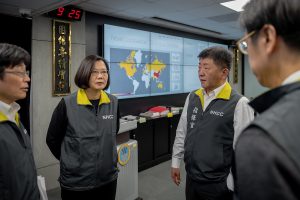Taiwan has been cast along with other East Asian and Oceanian states as one of the world’s COVID-19 success stories. But as countries such as New Zealand and Vietnam have seen domestic outbreaks during the summer, Taiwan’s last five months and counting continue to be defined by one number: Zero, the number of local transmissions recorded since April 12.
On that day, Taiwan had confirmed a total of 388 cases. As of Friday, Taiwan had recorded a total of 498. Every positive COVID-19 case recorded since April 12 has been either imported – from a person traveling from abroad who tested positive during a mandatory 14-day quarantine – or from a cluster aboard a navy ship returning from a goodwill trip to Palau.
It’s a remarkable achievement for Taiwan, which recorded its first coronavirus case on January 21 and, that same month, was projected by experts to have the world’s second-worst outbreak after China.
Instead, life has remained normal. The country has never instituted lockdown measures and the vast majority of businesses remain open. The closure of borders to international travelers has led to a domestic tourism boom, with hotspots like Hualien, Taitung, and Kenting seeing overflows of Taiwanese visitors during the summer.
Most facemask and social distancing measures have been relaxed since the early months of the pandemic. Masks are still required on public transportation, and many Taiwanese still wear masks on crowded sidewalks or in enclosed areas like shopping malls.
Aside from this, life has continued as normal with only a few minor hiccups.
In late July and early August, a series of suspected domestic cases shook Taiwan after several outbound travelers tested positive for COVID-19 upon arriving in other Asian countries. However, most of the cases turned out to be false positives, and tests of people in Taiwan who had contacted these travelers did not turn up any domestic COVID-19 cases.
Still, this led to warnings from Chen Shih-chung, the popular health minister, for Taiwan to remain vigilant along with temporary shortages of facemasks, which are now sold by the box without the strict rationing in the winter and spring.
Chen did receive criticism last month over Taiwan’s relatively limited COVID-19 testing when an antibody testing program in central Changhua County was abruptly canceled the night before results were scheduled to be released.
The Changhua study ultimately found a low antibody count among the people tested, an unsurprising result indicating an extremely low likelihood of undetected COVID-19 transmission in the area.
Chen has argued that more testing would create more false positives and overload Taiwan’s health care system. Taiwan has not tested as much as neighbors such as South Korea – but it has also reported far fewer cases.
Taiwan’s government also received some criticism over its decision to allow a delegation led by U.S. Health and Human Services secretary Alex Azar to enter the country in August without undergoing a 14-day quarantine.
However, the entire delegation had tested negative before departing the U.S. and after arriving in Taipei, and the trip did not lead to any known transmission of the coronavirus.
A larger delegation from the Czech Republic arrived in Taiwan earlier this month, also without quarantining. That delegation also tested negative before and after their flight to Taiwan, and media coverage of the visit was overwhelmingly positive.
Despite its success in stamping out local transmission of COVID-19, Taiwan remains excluded from the World Health Organization. This remains unlikely to change as the United States – previously the highest-profile supporter of Taiwan’s bid to participate in WHO functions – has started the process of formally withdrawing from the WHO itself.
Aside from its isolation on the international stage, Taiwan has fended off escalated military aggression from China in recent weeks. Throughout it all, however, it has almost entirely fended off a pandemic that has impacted nearly every country in the world.

































